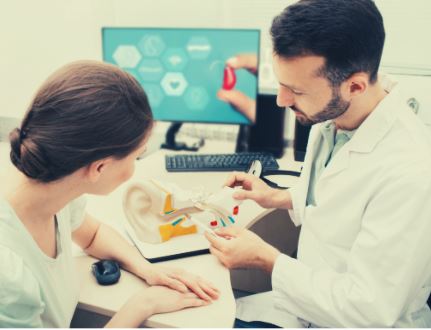This is the fifth and final post in a series on why people with hearing loss should care about person-centered care. Today’s post discusses person-centered care’s fourth tenet: Think Beyond the Technology.
For many of us, audiologist visits center around our hearing technology. Are our hearing aids working properly? What adjustments do they need? What accessories might come in handy in this new pandemic world? And these are important questions. But imagine if part of the appointment focused on non-technical skills like communication best practices we could share with our conversation partners, or the latest way to connect with other people with hearing loss. We would leave the appointment, not only with our devices in tip top shape, but also wiser and better equipped to handle our next communication challenge.
This could be the norm, if your audiologist thinks beyond the technology.
Why Is Thinking Beyond the Technology Important?
Audiologists are the first call for many of us when we start struggling with our hearing loss. While some communication best practices may seem obvious to us overtime, they certainly were not to me or my family at the start of my hearing loss journey. And utilizing them can turn frustrating listening situations into productive ones.
When our audiologists think beyond the technology, we develop a wider array of tools we can use to create better communication, the main goal of person-centered care.
What Should You Look For?
Audiologists who think beyond the technology spend part of each appointment counseling their patients about the softer skills needed for better communication.
Provide best practice communication tips.
Best practice communication tips include things like getting the person’s attention before speaking, making sure to face the person with hearing loss, and talking in a clear and steady manner. Small changes in behavior can make a huge difference in effective communication.
Share these tips with your conversation partners to help them understand the ground rules for good communication. The best audiologists will provide tips in written form, so they are easier to share with family, friends and co-workers.
Teach you to be a better listener.
Communication is a two-way street. While many best practices rely on our communication partners to make accommodations, there are also things that we can do. Examples include being open about your hearing loss and asking for the assistance that you need. Scheduling important conversations for the morning when you are more rested can also be helpful.
Help you manage hearing loss exhaustion.
Do you feel exhausted at the end of a long day of listening? Of course you do, because listening takes work for people with hearing loss. I wish my audiologist had warned me about this. Only by comparing notes with other people with hearing loss did I realize this was normal and that I needed to pace myself to maintain energy.
Promote self-advocacy skills.
We must learn to ask for the assistance we need from our communication partners, but this can be tricky at first. Audiologists can help empower us by teaching us ways to ask for the help we need. This includes setting ground rules for conversations up front and using non-verbal cues like placing a hand behind our ear to let the speaker know we are having trouble hearing without interrupting the flow of the conversation.
Encourage you to use caption readers, hearing loops and other accommodations.
I learned about these miracle devices from other people with hearing loss and wondered why my audiologist had not mentioned the wide variety of accommodations available in public spaces for people with hearing loss. The best audiologists will educate their patients about accessibility options and encourage them to use them. The more these types of devices are requested in public spaces, museums, theaters and elsewhere, the more commonplace they will become.
Recommend hearing loss support groups.
Meeting other people with hearing loss helped me build confidence and overcome the stigma I felt about my hearing loss. I also learned many tips and tricks from my hearing loss friends that I use today to live my best life despite hearing loss. I only wish I had experienced the joy of finding hearing loss peers sooner.
For more details on finding an audiologist that thinks beyond the technology, please consult my e-book Person-centered Care from the Patient’s Perspective.
.

Shari Eberts is a hearing health advocate, writer, and avid Bikram yogi. She is the founder of Living With Hearing Loss, a blog and online community for people living with hearing loss and tinnitus. She also serves on the Board of Trustees of Hearing Loss Association of America. Shari has an adult-onset genetic hearing loss and hopes that by sharing her story she will help others to live more peacefully with their own hearing issues. Connect with Shari: Blog, Facebook, LinkedIn, Twitter.







Thank you for sharing your expertise and personal experience with us, people like myself who is profoundly hard of hearing.
When we finally get better control of the virus pandemic I’m looking forward to going to movie theaters. I have fond memories being hypnotized by good movies. However when I lost much of my hearing, watching a movie at a theater is now difficult to enjoy and tiresome. I read that there are special glasses for the hard of hearing to wear where they can not only loop into a better sound for their cochlear aid but are able read caption through the use of special glasses. What are these theater tools called and where can I read how to go about asking for those services in my small town? I appreciate your feedback
I notice that in a 100 mile radius from my house there is not one practicing audiologist who uses REM testing when fitting hearing aids. How can a conscientious Doctor of Audiology NOT administer this test. When they do not, they do not have the best interests of their patients at heart. Am I wrong?